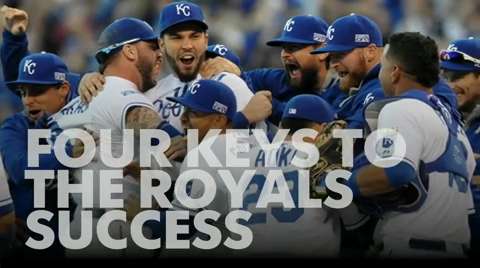Velocity key to Royals' postseason success
SAN FRANCISCO - We've become enamored with the pace at which the Kansas City Royals go about their business this postseason, so much so it's clouding the picture of how they win and even their chances of finding the three more victories they want.
Their mayhem on the basepaths won them the American League wild-card game and turned a chatty backup outfielder and the rawest of minor leaguers — Jarrod Dyson and Terrance Gore — into something of playoff folk heroes.
Never mind the Royals have two stolen bases in their last seven games and one of them was by Billy Butler, the slam-dunk choice if you were asked to guess which Royal is nicknamed Country Breakfast.
Now, off the Royals' Game 2 World Series victory, the speed talk is focused on the velocity — often overwhelming — of their pitchers.
The four pitchers manager Ned Yost used in Game 2 just happened to be — and, no, it's not a coincidence — the four on the roster whose fastballs have averaged more than 95 mph this season.
When you can line up Yordano Ventura (average fastball 97 mph this season), Kelvin Herrera (98.1), Wade Davis (95.7) and Greg Holland (95.8), as Yost says, "You know what I did? Nothing. I took Herrera and put him in the ballgame in the sixth inning, and if that makes me a genius, then I'm a genius. My players won a ballgame."
Yes, that has become the easy part.
Starting today with Game 3 here at AT&T Park, the question for the Royals is how they get back to those four guys.
Jeremy Guthrie, Jason Vargas and lopsided Game 1 loser James Shields are the three Kansas City starters charged not only with somehow trying to get these games back into the hands of Herrera, Davis and Holland for the final three or four innings but also giving Ventura and his excellent stuff another opportunity in Game6.
Nobody's going to confuse Guthrie, Vargas and Shields with Wednesday's flame-throwing quartet. Savvy veterans, sure, but these are going to be different ballgames.
"Guthrie and Vargy are both fly-ball pitchers in a big yard with some weird angles," Yost says of moving to AT&T Park with its 421-foot gap in right-center and plenty of room for outfielders to roam.
And pay close attention to the rest of Yost's statement:
"So we're looking at all our options," he says.
He wouldn't give any hints on his Game 3 lineup, but could he decide the size of the ballpark and the style of his starting pitchers add up to Jarrod Dyson starting in center field with Lorenzo Cain in right? After all, Yost was quick to make the move — which removes starting right fielder Nori Aoki — with the score tied in the sixth inning of Game 2.
The less obvious part of the velocity equation is that the Royals' Game 2 quartet have more to offer than just radar gun readings for the fans.
Much has been made of the Giants players' ability to hit well against 95-plus-mph pitches — .275 batting average during the season and .377 in the postseason before Wednesday.
Beware such numbers.
That playoff stat was compiled over 68 plate appearances, invoking the small-sample-size asterisk, but we're also talking about pitching.

Just as the Royals like to think the threat of using their speed on the basepaths works to their advantage, all they need to do is give the opposition a whiff of the high-octane pitching.
Holland's three outs in the ninth inning were strikeouts. The third strike in each case was a swing at a pitch below the strike zone, and two of them were on sliders less than 90 mph. Those three pitches were the only swings and misses against Holland in the inning.
Davis had two strikeouts in the eighth, also on swings and misses at pitches below the strike zone — one a fastball, the other a curve. In fact, the Giants swung at nine of Davis' 14 pitches and missed four times — three on curves.
Ventura pitched into the sixth inning, averaging 97.9 mph on his fastballs and getting as high as 101. Yet the Giants had four swinging strikes against him all night, none on his fastball.
And the Giants aren't exactly the masters of contact — 21st in the majors in contact rate at the plate and seventh in swinging strikes.
The point: Velocity is more impressive than effective without other assets, just as the Royals have stressed making sure their aggressive baserunning has a purpose.
But it's still clear Kansas City is going to need an awful lot of finesse just to give us another chance to get all excited about bringing the heat.